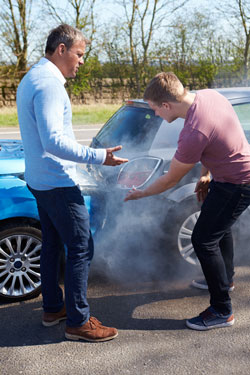Why who’s at fault matters for your settlement
Calculating your auto injury settlement can be complicated. An experienced personal injury attorney can help determine who is at fault.
So who’s fault was it, anyway?
Asking a question like that after a car accident might seem a bit tacky to you, especially if people were injured. But at some point, someone’s going to ask.
That’s because determining who’s at fault is the necessary first step in calculating a settlement amount. You have to figure out who gets the settlement before you can figure out how much the settlement’s going to be, after all.
The state of Florida is what is known as a “no-fault” state, which means that no individual can be sued for damages in a car accident case unless severe bodily damages are involved. And while that may sound like it limits your chances of getting a fair and equitable settlement, that’s not necessarily the case. For example, personal injury damages can be awarded for a car accident in a no-fault state.
Your lawyer can help you navigate through the more confusing legal and procedural concepts. Your attorney will also begin building your case by reviewing all the available legal documentation for your accident, including:
- Police reports
- State traffic laws
- Witness statements


The sheer number of personal injury claims is on the rise in the United States, and much of that increase is coming from auto accidents.
While nobody knows for sure why this is happening, a lot of people believe that new technology is playing a role – by distracting us when we should be concentrating on the road.
For example, mobile phones and GPS devices encourage us to take our eyes off the road for just a quick second or two, which can be more than enough time to cause an accident.
Other factors include:
- Negligence: failure to show “reasonable care” when operating a motor vehicle
- Ignoring traffic signals or signs
- Failure to signal
- Disregarding weather conditions
- Reckless Driving: wanton disregard for the rules of the road
- Speeding
- Improper passing
- Texting and driving
- Drunk Driving: operating a vehicle while under the influence of alcohol
That last one is a big one: Every 30 minutes, someone in the U.S. dies in an alcohol-related collision. The worst part of that statistic is that every one of those deaths is completely preventable.
Rear-end collisions
The most common of auto accidents, rear-end collisions, are usually the easiest to settle.
That’s because there is a long-standing rule that has established that, in nearly every rear-end collision, the “tailing” driver involved is at fault. Insurance companies rely on this rule when calculating and determining settlement offers, and they almost never pursue a liability-based argument.
Determining settlements for rear-end collisions
Rear-end collisions are simple. Because of this, the only variable in a victim’s settlement offer is the damages. Insurance companies actually use a formula for damages when they put together their settlement offers:
Damages Formula
1) Special formula:
This part of the formula is used to determine economic-based claims, and they offer a specific monetary value.
- a. Medical bills;
- b. Rehabilitation costs;
- c. Property loss and repair.
2) Lost income:
- a. Determined by calculating the victim’s income prior to their auto accident and then multiplying that by the time away from work.
3) General damages:
These are generally non-economic damages, and are multiplied on a scale of 1.5 to 5. The multiplier is based on the severity of the damages – the more serious the injury, the higher the multiplier.
-
- a. Emotional trauma
- b. Wrongful death
4) These three totals are summed, and that number becomes the settlement offer.
Be sure to consult with a personal injury attorney immediately to assist with dealing with the insurance companies and obtain the compensation you are owed.
Don’t hesitate. If you or someone you know has been involved in an auto accident that resulted in personal injuries, speak with an experienced attorney as soon as possible to make sure you get the compensation you deserve.


